EPA awards nearly $1.2 million in environmental justice grants
Watershed organizations in Baltimore, Maryland, and Lexington, Virginia, among those to receive funding

The U.S. Environmental Protection Agency (EPA) will award nearly $1.2 million in competitive grants to local and tribal organizations working to address environmental justice issues in their community. EPA’s Environmental Justice Small Grants provide critical support to organizations that otherwise lack the funding and resources to address challenges in their community.
Thirty-six organizations across 30 states and Puerto Rico will receive funding to educate local residents about environmental issues that may impact their health; collect data about local environmental conditions; and work collaboratively to address environmental justice challenges in their community. Additionally, the grants may be used for activities that educate and empower youth and the next generation of leaders in STEM (science, technology, engineering and math) related job sectors and environmental stewardship.
Two organizations in the Chesapeake Bay watershed received awards:
- The Patapsco Latino Action Network, a program under the National Aquarium’s Conservation Department, in Baltimore, Maryland, received funding to cleanup marine debris and engage community residents in the Brooklyn and Curtis Bay neighborhoods. They’ll do this by organizing four cleanups and three neighborhood beautification events, surveying community members on the perception of marine debris and other environmental issues, and developing a marine debris mitigation action plan. They will also develop Spanish-language outreach materials and conduct educational outreach to partners on marine debris and other educational challenges. The project will be led by Templo de Alabanza y Restauracion congregation, the Maryland Port Administration, the Living Classrooms Foundation and the U.S. Fish and Wildlife and Service.
- The Boxerwood Education Association in Lexington, Virginia, will develop and pilot a replicable model that addresses advancing citizen-level environmental stewardship in under-resourced rural or small-town populations. The pilot program will recruit high school students for fall and summer action team programs, make public presentations and reports to organizations and create a sustainable Green Team curriculum and toolkit for other organizations and communities facing environmental justice issues to replicate.
Learn more about what the Chesapeake Bay Program is doing to increase diversity in the watershed and address environmental justice issues.

Comments
There are no comments.
Thank you!
Your comment has been received. Before it can be published, the comment will be reviewed by our team to ensure it adheres with our rules of engagement.
Back to recent stories